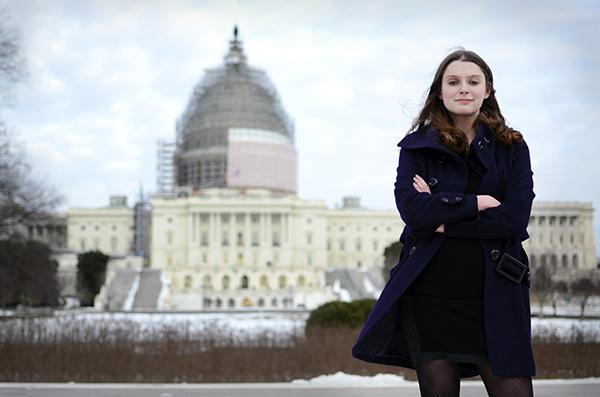Students Against Sexual Assault and other GW students will join Sen. Timothy Kaine, D-Va., on Capitol Hill next month to lobby for a sexual violence education bill targeting middle and high school students.
Freshman SASA member Eve Zhurbinskiy is organizing D.C.-area college students to push senators to pass the Teach Safe Relationships Act, which would allocate funding for teaching students in secondary schools about how to prevent sexual violence and harassment.
“I don’t think Congress or any state legislature can magically make sexual assault go away completely, but I do think the government has a role in supporting survivors and preventing sexual violence,” Zhurbinskiy said.
Ever since her freshman year of high school, when a friend confided in her about being sexually assaulted, Zhurbinskiy has followed sexual violence legislation at the state and national levels and has been an advocate for sexual violence survivors, she said.
“Being so young, I didn’t know much about the resources available to survivors or the effects of sexual assault. I was also frustrated that the sex education class at my school did not comprehensively address this issue,” Zhurbinskiy said. “It’s critical that schools be given greater resources to educate students about sexual violence because preventing sexual assault starts with education.”
If passed, the Teach Safe Relationships Act would allow school districts to compete for grants from the Department of Education to implement curricula focused on sexual assault prevention, domestic violence and maintaining healthy relationships.
The bill would be the first national legislation to fund education about sexual violence and healthy relationships, and is currently under review by the Senate Health, Education, Labor and Pensions Committee. National organizations, including Planned Parenthood and the National Women’s Law Center, have endorsed the bill.
Kaine said he wrote the bill with young people in mind based on conversations with the University of Virginia’s sexual violence awareness and advocacy group, One Less.
“I’m pleased GW Students Against Sexual Assault and other student groups are supporting the Teach Safe Relationships Act,” Kaine said in an email. “I appreciate their efforts to raise additional support on Capitol Hill for the bill, which would allow secondary schools to play a role in promoting safe relationship behavior and teaching students about these issues that disproportionately impact young people.”
Kaine introduced the bill — cosponsored by Sen. Kirsten Gillibrand, D-N.Y., Sen. Claire McCaskill, D-Mo. and Sen. Richard Blumenthal, D-Conn. — earlier this month. Policymakers have focused on sexual violence education and prevention since the Department of Justice reported that more than 290,000 Americans are victims of rape and sexual assault each year, with women between the ages of 16 and 24 consistently experiencing the highest rate of intimate partner violence.
Students from GW, American, Georgetown, Catholic and George Mason universities and the University of Maryland will go in groups of three or four people to senators’ offices for short meetings on two consecutive days between March 17 and 26.
Zhurbinskiy said student lobbyists will target senators on the Health, Education, Labor and Pensions Committee, but they may speak with other senators, depending on how many students participate. About 40 students have registered online so far, and Zhurbinskiy said she hopes as many as 100 students participate.
“This tends to be the kind of thing that doesn’t really get a lot of attention and gets to committees then dies,” Zhurbinskiy said. “It’s up to us to bring attention to this issue so that we can force a move on it.”
GW student organizations, including SASA and College Democrats, have committed to lobbying, as well as American University’s Students Against Sexual Violence. GW College Democrats Vice President Amelia Williams said the group is participating because the issue is not well-enough addressed on a federal level.
“Too many institutions are failing to keep up with increasing rates of sexual assault nationwide, which is why congressional legislation is critically important to properly begin addressing the problem,” Williams said in an email.
The bill was introduced by four Democratic senators, but SASA co-president Laura Zillman said she wants students to believe that sexual assault education is a bipartisan issue.
“While SASA tries to remain almost entirely apolitical on most issues, this act just makes sense,” Zillman said.
Sexual violence has been at the forefront of GW student leaders’ efforts this semester, following the release of the University’s anonymous campus climate survey results, which found that 36 percent of upperclass women had experienced unwanted sexual behavior. The Student Association Senate passed a bill this week that will put whether students should receive mandatory sexual violence training at Colonial Inauguration to a student-wide vote.
SASA co-president Kirsten Dimovitz said mandatory training for incoming freshmen would help “build a safe community” at GW, but education in secondary school would make an even wider impact on universities’ cultures.
“Supporting this legislation and ensuring that it passes is crucial because it will both propel the issue of sexual violence to the main stage and take steps to educate all of the next generation of Americans,” Dimovitz said.
Mike Domitzr, the founder of the Date Safe Project, said educating and providing students with the skills to make safe and healthy relationship decisions in middle and high schools is key to creating a positive university environment. The Date Safe Project is a national organization that holds trainings for middle schools, high schools, universities and the military about healthy relationships and consent.
“Students come to their campuses with what they’ve learned culturally in middle and high school,” Domitzr said. “The fact that students are stepping forward is critically important because there isn’t a track record about this happening on a legislative level before.”
The president of Students Against Sexual Violence at American University, Amanda Gould, said she supports national legislation over state legislation because “people’s conservative views get in the way” at the state level.
“I don’t think that should be up to personal beliefs held by people in the state that are religious,” Gould said.







